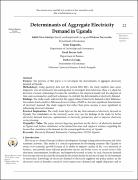Determinants of aggregate electricity demand in Uganda

View/
Date
2018Author
Nakirijja, Judith Flavia
Kiggundu, Tonny
Keryne Ajok, Sarah
Lwanga, Barbara
Metadata
Show full item recordAbstract
Purpose: The purpose of this paper is to investigate the determinants of aggregate electricity
demand in Uganda.
Methodology: Using quarterly data over the period 2001-2015, the study employs time series
diagnostic tests of stationarity and cointegration to investigate data behaviour; there is a check for
direction of causal relationships between the variables in the empirical model; and the adoption of
time series econometric analytical techniques to establish the determinants of electricity demand.
Findings: The study results indicate that the lagged values of electricity demand in first difference,
the random shocks and first differenced current values of GDP are the most significant determinants
of electricity demand. The study suggests that rather than price, income is more significant in
influencing electricity demand.
Practical Implications: The study sheds light on the key determinants of electricity demand in
Uganda. The stakeholders in the electricity sector may use the findings of the study for better
electricity demand forecasts, optimization of electricity production and to improve electricity
sector planning.
Originality/ Value: The paper answers lingering questions on the drivers of electricity demand
in Uganda and further contributes to the limited literature and empirical evidence regarding the factors that contribute to the demand for the national grid electricity in Uganda
